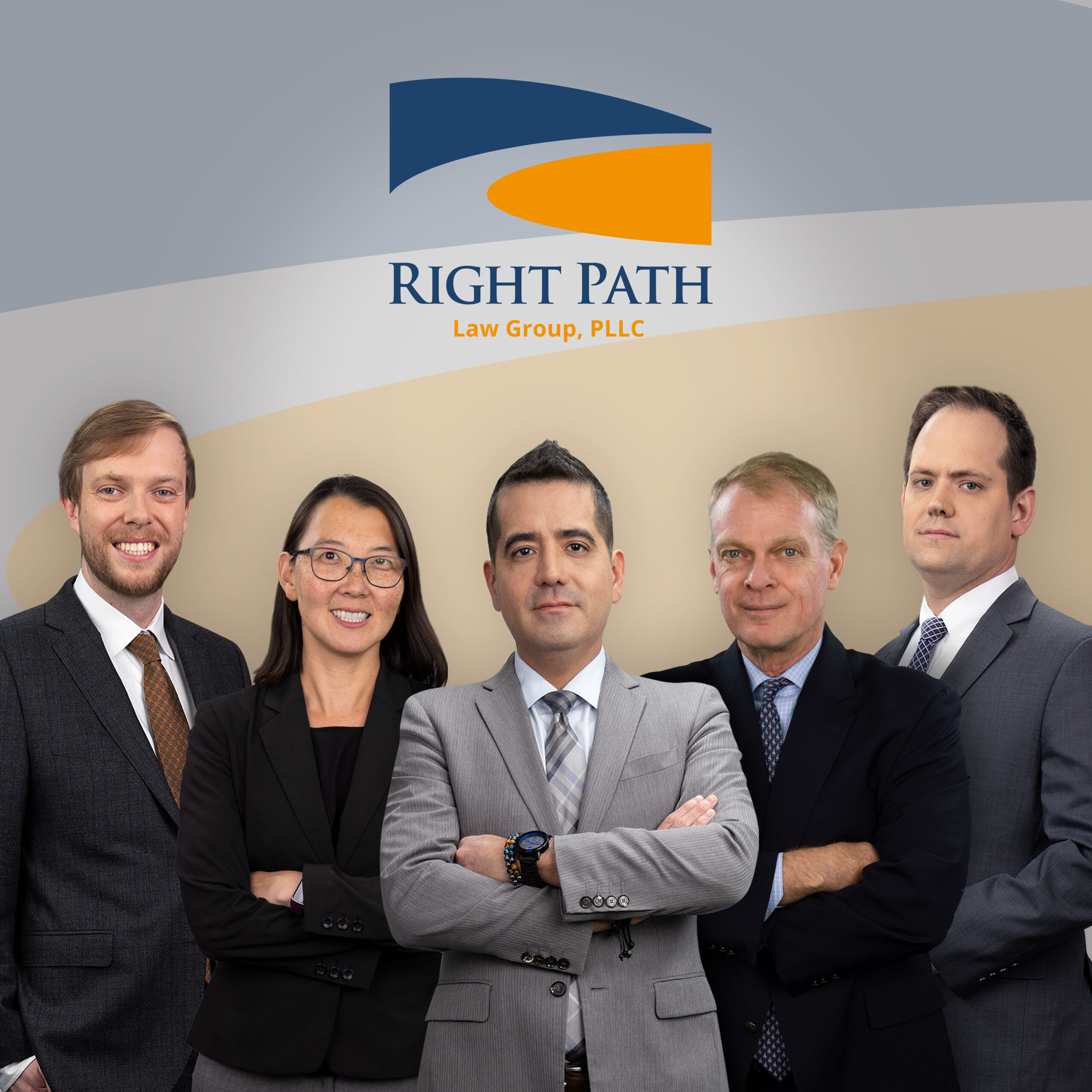Traumatic brain injuries are severe and potentially life-changing. They can cause problems with thinking, memory, movement, and emotions. If you or someone you know sustains a TBI, the road to recovery might be long and require a lot of care, which is often highly expensive.
Filing an injury claim can help you recover the money necessary for medical bills, lost income, and other costs that relate to the injury. A Fairfax TBI accident lawyer from Right Path Law Group can guide you through this process.
Why Choose Right Path Law Group , for your TBI Accident Case?

If you or someone close to you suffers a TBI, the legal team you choose can make a big difference in your journey to justice and recovery. At Right Path Law Group , we understand the complex nature of TBI claims and the profound effects such injuries have on your life. Here’s why you should entrust us with your case:
Local Roots and Personalized Attention
Our attorneys have deep roots in Northern Virginia, specifically in Fairfax County and Prince William County. This insight enhances our ability to navigate the local legal system on your behalf. We don’t just represent clients. We serve our neighbors, offering personalized attention in each case.
Compassionate, Client-Centric Approach
We recognize the physical, emotional, and financial toll a TBI can take. Our approach combines compassion with legal acumen. We work to understand your situation fully and tailor our strategies to meet your specific needs. You are not just a case number to us. You are a member of our community who deserves the utmost care and attention.
Dedicated to Fair and Full Compensation
Our goal is to secure the compensation you rightfully deserve. We diligently work to address all aspects of your claim, including medical expenses, lost income, and the emotional effects of your injury, in your settlement or court proceedings.
Excellence in Representation
With more than 15 years of dedicated service, our firm has built a local reputation for excellence in personal injury law. This experience means we have the knowledge and skills necessary to effectively advocate for your rights, whether in settlement negotiations or at trial.
Standing by You Every Step of the Way

Facing a legal battle can be daunting, especially when dealing with the aftermath of a TBI. We stand by your side throughout the entire process, providing clear guidance and support. From the initial consultation to the final resolution of your claim, our attorneys will be your steadfast allies.
Choosing Right Path Law Group , means opting for a team that combines local knowledge, compassionate service, and a track record of excellence. We are here to fight for your rights and demand the justice and recovery you deserve.
How Can a TBI Hurt You?
A traumatic brain injury (TBI) occurs when sudden trauma causes damage to the brain. This can happen during events like traffic collisions, falls, or sports accidents.
When something hits your head hard or jolts it abruptly, it can cause your brain to move inside your skull. This movement can lead to bruising, bleeding, tearing, or other damage to your brain.
Brain injuries can range from relatively mild concussions to severe wounds, which can cause long-term complications or even death.
TBIs of any nature are serious injuries that can affect a person’s ability to think, feel, and act. Common TBI symptoms include headaches, confusion, blurred vision, and difficulty concentrating.
In more serious cases, patients might experience prolonged unconsciousness, memory loss, or changes in behavior. Prompt medical attention is essential after a head injury, as early treatment can make a big difference in recovery.

What Are the Different Types of TBI?

Traumatic brain injuries come in various forms, each with unique characteristics and effects on the brain.
The following examples of TBIs can affect individuals in different ways:
- Concussions: A concussion often results from a blow to the head or a sudden jolt, like in sports accidents or car wrecks. It temporarily disrupts brain function, leading to symptoms like headaches, confusion, dizziness, and sometimes loss of consciousness. While most people recover fully, repeat concussions can have long-term effects.
- Contusions: A contusion is a bruise. When contusions affect the brain, they can cause swelling and bleeding inside the skull, leading to various symptoms like confusion, drowsiness, and difficulty with coordination and memory. Severe contusions sometimes require surgery to relieve pressure.
- Coup-Contrecoup Injuries: This occurs when the force of a blow causes the brain to rebound and strike the opposite side of the skull as well, resulting in contusions on both sides of the brain. These injuries are common in car crashes and can lead to significant brain swelling and damage.
- Diffuse Axonal Injuries (DAIs): This TBI happens when the brain rapidly shifts or twists inside the skull, tearing the nerve fibers that let one side of the brain talk to the other. DAIs often result from car accidents or falls and can lead to unconsciousness and severe brain damage.
- Penetrating Injuries: These injuries happen when an object, like a bullet or a sharp piece of metal, pierces the skull and enters the brain. The foreign object causes severe and potentially life-threatening damage along its path. Immediate medical intervention is essential in these cases.
- Anoxic Brain Injuries: This type of injury occurs when the brain does not receive any oxygen. Anoxic brain injuries often result from incidents that cut off air supply, like near-drownings or cardiac arrests. These injuries can cause widespread brain damage.
- Hypoxic Brain Injuries: Similar to an anoxic injury, this happens when the brain receives some, but not enough, oxygen. Causes can include choking, smoke inhalation, or complications from anesthesia. This type of injury can lead to cognitive and motor function impairments.
- Second Impact Syndrome: This rare but dangerous condition occurs when an individual suffers a second concussion before the first one has fully healed, which sometimes leads to rapid and severe brain swelling. It can result in permanent brain damage or even death.
How Do TBIs Occur?
Traumatic brain injuries can occur in a variety of situations where something strikes, jolts, or otherwise injures the head.
Here are some common examples:
- Vehicle Accidents: Car, motorcycle, and truck accidents are among the leading causes of TBIs. During a collision, the head can strike part of the vehicle or an object outside the vehicle. The sudden stop or change in direction can also cause the brain to move inside the skull, leading to injury.
- Bicycle and Pedestrian Accidents: When vehicles strike cyclists or pedestrians without proper head protection, the cyclists and pedestrians are at high risk for TBIs. These injuries often result from direct blows to the head, causing various degrees of brain damage.
- Falls: Falls are a major cause of TBIs, particularly in children and older adults. Falling from heights, slipping in the bathroom, or tripping on uneven surfaces can result in hitting the head, causing mild to severe brain injuries.
- Sports Injuries: Contact sports like football, boxing, hockey, and soccer frequently result in TBIs. Athletes can suffer concussions or more severe brain injuries from blows to the head or collisions with other players or sporting equipment.
- Acts of Violence: Assaults, domestic violence, gunshot wounds, and child abuse are also significant causes of TBIs.
- Explosive Blasts and Combat Injuries: Military personnel are at risk for TBIs due to explosive blasts in combat. The shockwaves from explosions can cause significant brain injuries, even without a direct blow to the head.
- Workplace Accidents: Injuries at the workplace, especially in construction, manufacturing, and industrial settings, commonly cause TBIs. Falling objects, slip-and-falls, and struck-by accidents can all result in TBIs.
- Recreational Activities and Sports: Recreational activities like skiing, snowboarding, horseback riding, and mountain biking also pose risks for TBIs. Accidents during these activities can result in severe blows to the head that sometimes lead to brain injuries.
No matter the cause of your TBI, working with an experienced lawyer from Right Path Law Group can optimize your recovery.
How Much Is a TBI Accident Case Worth?

The value of your TBI accident case can vary considerably depending on the circumstances, including the severity of the injury and how it occurred.
Here are some common types of compensable losses for which you could demand money in your TBI claim:
- Medical Expenses: This includes the costs of all medical treatments that relate to your TBI – emergency room visits, hospital stays, medications, doctor’s appointments, and ongoing therapies. You can also claim money for future medical expenses if your injury requires long-term care.
- Lost Income: If your TBI forces you to miss work, you could claim compensation for the earnings you lost while you were unable to work. If your injury affects your ability to return to work or to work in the same capacity as before, you could also claim money for lost earning potential.
- Pain and Suffering: This type of compensation accounts for the physical pain and emotional distress resulting from the TBI. It compensates you for the discomfort, depression, anxiety, and other mental health issues that often accompany such serious injuries.
- Loss of Enjoyment of Life: If the TBI affects your ability to enjoy daily activities and hobbies, compensation for loss of enjoyment of life covers those losses.
- Loss of Consortium: This refers to the effects of your injury on your relationship with your spouse. It covers the loss of companionship and affection and any strain the injury has placed on the marital relationship.
- Rehabilitation Costs: Rehabilitation expenses, including physical therapy, occupational therapy, and speech therapy, are also compensable. These therapies are often essential for recovery and regaining skills that the TBI affected, such as speech, mobility, and cognitive functions.
- Home or Vehicle Modifications: In some cases, your TBI might require modifications to your home or vehicle to accommodate your new needs, such as wheelchair ramps or special equipment. You can include the costs of these modifications in your claim.
Filing an Insurance Claim After a TBI
Filing an insurance claim after a traumatic brain injury is a challenging and often overwhelming process.
A TBI is a serious condition that can change your life dramatically, requiring extensive medical treatment, rehabilitation, and possibly long-term care. When you file an insurance claim, you are seeking financial support to cover these significant costs.
However, insurance companies often work hard to minimize the amounts they pay out. They might try to argue that your injury is not as severe as you claim or that your symptoms are from a pre-existing condition. Sometimes, they might offer a quick settlement that is much less than what you truly need for your long-term care and recovery.
This is where a lawyer comes in handy. They know how to gather the necessary medical evidence and expert opinions to demonstrate the full effect of your TBI.
A Fairfax TBI lawyer from Right Path Law Group can negotiate with the insurance company on your behalf, ensuring that they treat your claim fairly. They will fight to get you the maximum compensation for medical bills, lost income, ongoing care costs, and pain and suffering.
What to Do After a TBI
If you or someone close to you suffers a TBI, protect your rights and ensure you receive proper care.
Here’s what you should do:
- Ask for copies of all medical reports and tests.
- Follow your doctor’s orders and attend all follow-up appointments.
- Monitor and document any changes or worsening symptoms.
- Keep a diary of your symptoms and recovery progress.
- Contact a TBI lawyer for advice as soon as possible.
- Collect evidence about the cause of the injury (e.g., accident reports).
- Take photos of the injury and the accident scene, if applicable.
- Gather contact information from witnesses, if any.
- Do not provide statements to insurance companies without legal advice.
- Keep track of all expenses that relate to the injury.
- Communicate regularly with your lawyer about the case.

Contact a TBI Accident Attorney in Fairfax
Did you or someone you love sustain a traumatic brain injury through no fault of your own? If so, you deserve fair compensation for your medical bills, income losses, and other expenses. The Fairfax TBI accident lawyers at Right Path Law Group , can help you get it. Contact us now at (571) 556-8710 to learn how in a free case review.
